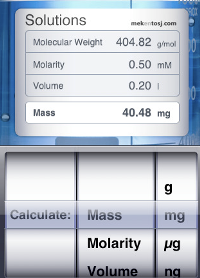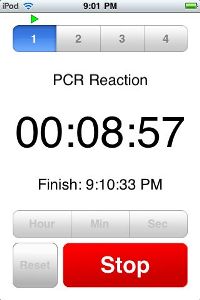Although the desktop computer has long been the workhorse for modern scientists, it is high time for academics to embrace the next technological wave that is mobile computing. We have all been comforted by the efficiency with which today's computers allow us to process data and information. Now, emerging mobile computing platforms will allow researchers to access and manipulate information no matter where we are. The iPhone is a good example of a mobile device that can yield a substantial productivity boost for scientists. If you are an academic and use the iPhone or iPod Touch, here are the 10 apps that will benefit you most. Feel free to add apps that you like and use for your work in the comments.1) linkurl:
Molecules;http://www.sunsetlakesoftware.com/molecules Molecules is an application for viewing 3D protein structures. Need to quickly look up a protein structure? Just pull up the Molecules app and browse through the Research Collaboratory for Structural Bioinformatics linkurl:database,;http://www.rcsb.org/pdb/home/home.do download the structure, and you're good to go.
Price: Free 2) linkurl:
Solutions;http://mekentosj.com/iphone/solutions/ Solutions is an app from the programmers at linkurl:Mekentosj,;http://mekentosj.com/ who make nifty software tools for the "mac-a-demic." It's a must have calculator for making quick calculations required to prepare stock solutions and buffers. The app is very well designed, keeps lists of recently entered chemicals and their molecular weights, and has the ability to search for chemicals and their molecular weights in online databases.
Price: $2.99 3) linkurl:
Promega;http://www.promega.com/pressrelease/20090407_paguideapp.htm Promega is a bundle of useful stuff from the Promega website thrown together as a handy iPhone app. This is mostly a web app, which means the application itself just provides an interface to the content on the Promega site. The BioMath calculators are the best part of the app. They help you handle conversions like μg to pmol, molar ratios of insert:vector concentrations, melting temperature calculations and more.
Price: Free 4) linkurl:
iCut DNA;http://www.chrysalisinitiative.com/ecg/iCutDNA/ Molecular biologists can typically remember the restriction sites of a couple of enzymes, but it's tough to memorize the sites for more than 10 or so. That's where iCut DNA comes in. This app brings New England Biolab's Restriction Enzyme Database (REBASE) of around 2000 enzymes onto your mobile device, allowing you to look up the recognition sequence of any type II restriction enzyme available on REBASE. The interface is seamless, and tracking down any enzyme is a snap. The app also lets you to select molecules based on enzyme name (with a handy auto-suggest drop down menu that narrows down enzymes based on your text input) or recognition sequence (again with auto-suggest drop down entries).
Price: $4.99 5) linkurl:
PubSearch Plus;http://www.deathraypizza.com/deathraypizza/iPhone.html PubSearch Plus gives you the ability to search PubMed from the comfort of your iPhone or iPod Touch, and lets you read and email selected publications. Though the iPhone screen isn't ideal for viewing high resolution images in research papers, it definitely helps when you're looking up a specific piece of information from a particular paper. The app also supports EZProxy so you can connect to journals that are available only through institutional access.
Price: $1.99 6) linkurl:
Papers;http://mekentosj.com/papers/iphone/ Papers is iTunes for research literature. Just as iTunes lets you sync your music with your iPod - the Papers app now has a companion app for the iPhone/iPod Touch that allows you to sync your collected journal papers. You can keep copies of all or some of your research papers on your mobile device for quick reading and reference. The built in pdf reader on the Papers app does the job comfortably and can be handled with versatile touch gestures. Papers also features "beaming" where users can send a pdf to another user or sync their library with a desktop wirelessly.
Price: $9.99 7) linkurl:
The Chemical Touch;http://openscience.org/~chrisfen/Pages/Programs/theChemicalTouch.html The Chemical Touch is an app that brings a souped-up periodic table to the iPhone and iPod Touch. An additional table of amino acids is one of the most useful parts of the app. The 20 amino acids appear with their single letter and three letter codes, isoelectric point, RNA codons, etc.
Price: $0.99 8) linkurl:
Labtimer;http://www.apptism.com/apps/labtimer Labtimer can be as useful in the lab as in the kitchen. As the name implies, it's a timer app that provides the feel of a conventional lab timer. There are four individual timers that can be set with corresponding text labels. The alarms on the app also play over any music that you may be listening to, making it useful even when you have your headphones in at the bench.
Price: Free 9) linkurl:
Evernote;http://www.evernote.com Evernote, which started out as a simple note taking tool, is now a solid information manager that can handle everything from voice notes to clippings pulled from the web. The beauty of Evernote is its versatility. I frequently use Evernote to collect notes from meetings and whiteboards directly to my mobile device, adding voice memos for better clarity. It has helped make me more efficient, especially with its ability to sync with all the different devices on which I'm running Evernote. I take a note on my iPhone, and it gets automatically synced to my desktop at home, my notebook, my netbook, and my work PC.
Price: Free 10)
RSS Reader RSS feeds are essential tools for anybody who deals with information overload. As researchers we are always looking for information online, be it research publications, news articles, Journal TOCs or blog posts. A mobile RSS reader helps cut down on information clutter, and several are available for the iPhone and iPod Touch. I would recommend an app that can sync with an online service where your feeds are handled so that they can be accessed via the computer as well as your mobile device. linkurl:Newsstand;http://omz-software.com/newsstand/ and linkurl:Byline;http://www.phantomfish.com/byline.html are two wonderful RSS reader apps that you should try.
Price: Byline $4.99, Newsstand $4.99
**Related stories:***linkurl:Pharma on Facebook?;http://www.the-scientist.com/article/display/55631/
[May 2009]*linkurl:Txting 4 fsh;http://www.the-scientist.com/article/display/53524/
[September 2007]*linkurl:The Mobile Scientist;http://www.the-scientist.com/article/display/14817/
[July 2004]





























